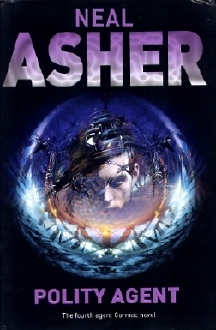 |
 Neal Asher
Neal Asher
Polity Agent
Reviewed by: Rick Kleffel © 2006
Tor UK / Pan Macmillan
UK First Edition Hardcover
ISBN 1-405-05498-0
488 Pages; £17.99
Publication Date:10-06-2006
Date Reviewed:12-19-06
Index:
Science Fiction
Horror
Perhaps we're lucky, living as we do in a time when humanity if pretty monolithic. We have little choice in the matter. We are born with the attributes dictated by a combination of our parents' DNA, and those qualities will grow, change with a very limited set of parameters and take us from the beginning to the end of our lives as humans, no definition required. Each of us, in all our variety, defines human.
Not so in the future as described by Neal Asher in his Agent Cormac novels. The latest novel in the series, 'Polity Agent', finds a variety of humans all wondering if they are still or want to remain human. The answer to the question is rather vital, as the Polity is being invaded by a viral technology that threatens to transform everything into something clearly not human. How far beyond human must Asher's characters go to ensure that humanity remains human? It's an intriguing question, and the answer involves many large monsters, immensely-scaled battles and some surprisingly nuanced transformations of characters we have know and meet in this novel for the first time.
The plot is complex and carried over from all of the previous novels in the series. Do not even dream of attempting to read 'Polity Agent' unless you've read, in order, 'Gridlinked', 'The Line of Polity' and 'Brass Man'. Each of these novels gets more than a nod, though the first and third are most prominently featured. The opening portions of 'Polity Agent' cover some old ground, but only in reference to a series of very new events. Asher uses his usual opening layers of narrative to rope together some slightly disparate strands and set up what's to come. The effect for those who have been reading the series is rather remarkable, slotting the previous novels as layers to the mystery that drives the latest in the series. As events ramp up, the scope of the series begins to get revealed in a manner most satisfying.
Jain technology is popping up in the Polity with disastrous results. It's infectious, destructive, and loose in the largest arcology of an inhabited planet. Something called the Legate is distributing that technology and has found a recipient it feels as potentially useful as Skellor, who displayed great skill at dispatching humans and spreading Jain tech in 'The Line of Polity'. A renegade AI has made an interesting discovery beyond the borders of Polity. A runcible has brought in refugees from the future. The Polity is headed to hell in a handbasket, with Cormac and Blegg the only ones in any position to pull on the brakes, let alone affect a turnaround.
Asher brings back Agent Ian Cormac, who is of course the titular 'Polity Agent'. Cormac is incomplete, his memories having been edited by an AI for his own safety. You can bet that he'll get integrated in the course of the novel, and in the interim, he behaves in a most entertainingly human manner. But Cormac has reasons to question his own humanity, and he's not alone. Horace Blegg, the immortal human created in the crucible of Hiroshima comes to the forefront here as well. He's clearly got some questions that need answering, immortal and human usually being mutually exclusive qualities. His past is revealed in a series of flashbacks ("retroacts") that show Asher's writing skills and harken to the time-tripping scenes in 'Cowl'.
Asher knows what his readers enjoy, and so we get Arach, a spider drone as irascible and invincible as anything we've seen in 'The Skinner' and 'The Voyage of the Sable Keech'. But Asher's best innovation here is Orlandine, a post-human "haiman" who wonders how far beyond human she wishes to venture. Certainly, she's willing to engage in murder. But Asher manages to make his murderess a fascinating and ultimately sympathetic character.
Asher's prose and writing skill have improved noticeably. 'Polity Agent' is his most effective series entry, acting as a sort of bevel to leverage his books up to a new level of cumulative quality. Readers get the sense of his universe opening up and revealing itself to be bigger than either Asher or they might have suspected. There's a sense of discovery and the rewards are consigned to those who have stuck with Asher through the first three books. But Asher also does better on the prose level of language. His writing is smoother and he gets in quite a few science-fiction double-entendres, the sort of jokes that have meaning both within the universe of the novel and within our own world as well.
Asher addresses a number of issues of interest to science fiction readers here, particularly that of the Singularity. In a universe where beneficent AI's run things for a mostly complacent human race that's a pretty big issue that's been hidden behind entertaining monsters thus far, but now Asher deals with it head on and succeeds at answering the reader's questions but more importantly at providing entertaining and satisfying answers to those questions. It's a big universe out there, big enough to accommodate godlike-minds as well as our tiny human ones.
'Polity Agent' satisfies on a number of levels, from the monsterama aspects that Asher's readers expect to the open-and-closed ending of the novel. More entries in this series are certain to come, and that's great news for those of us who enjoyed the first four. If you've not started, you’re not that far behind yet. Well, light-years and centuries, to be sure. But just step through the runcible gate that is 'Gridlinked' and you're here. There. In Asher's universe. Be warned: here be monsters. But also, like Orlandine and Cormac, great characters as well.
|
 |
